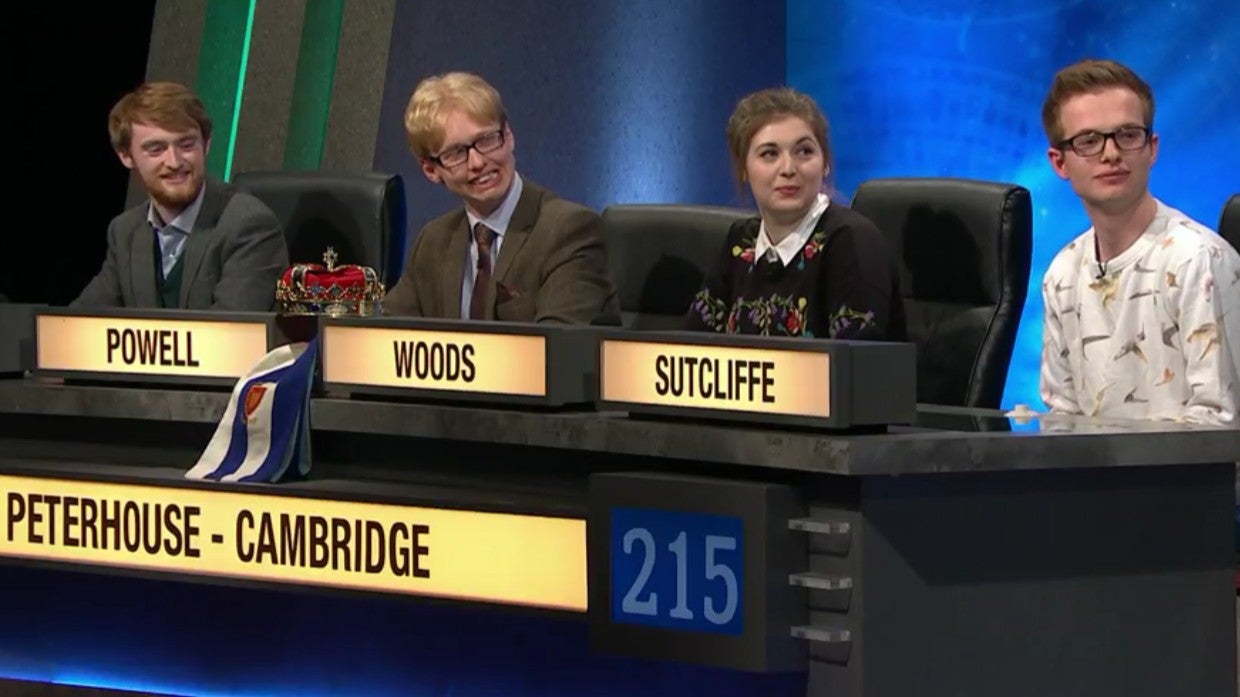University Challenge is intrinsically elitist, that’s why I love it
As a professor denounces the BBC’s popular student quiz for being rigged in favour of Oxbridge colleges, Matt Payton says there’s only one thing that needs to change about his favourite TV show


University Challenge is under fire – again. The long-running TV quiz for students has been criticised, not for having fielded too few women or minority contestants, for questions that are too easy (as if), or for one team’s mascot being antisemitic… but because Oxford and Cambridge are allowed to send five teams each per series.
Lesser establishments, such as the one I went to, have to make do with just the one. The programme is not what you’d call democratic. But the charge levelled this week by Professor Frank Coffield, emeritus professor at one of the smallest colleges in the University of London (which, surely by coincidence, is represented by teams from its various constituent bodies) has decried the popular format as “elitist”.
In this essay – which is written in pure undergraduate-ese on purpose – I will argue that, yes, it is… but that I am glad it is.
It cannot be said that Oxford and Cambridge – ancient establishments each made up of colleges, with more than 40 at Oxford, and more than 30 at Cambridge, and almost 50,000 students between them – are underrepresented on University Challenge. In its 52-series history, the joint-highest winner is Magdalen College, Oxford, which has triumphed four times.
Does this bother me as a graduate of a redbrick university? Not in the slightest. I am fully inured to the programme’s supposedly meritocratic deficit because I adore it. I am, however, perpetually embarrassed at my alma mater’s inability to make it through to the televised rounds (University of Nottingham, if you’re wondering).
The trouble with University Challenge is not resisting change, but that some would seek to alter a winning format in the first place. “Update” it, and I would miss the tongue-in-cheek factoids about the teams as they are introduced by the excellent new presenter, Amol Rajan (only the third in the show’s history).
If not for University Challenge, how many of us would know how Cardinal College became Christ Church, why Magdalen College (them again) is pronounced “maudlin”, and why a Trinity College statue holds a chair leg? (For the answers, you’ll either need BBC iPlayer or Google.)
I also rather enjoy the redbricks and former polys when they give Oxbridge a bloody nose, especially the college that can claim to have taught several prime ministers and viceroys of India. (Looking at you, Balliol). Similarly, it’s always fun seeing a massive Russell Group university, with its multiple series wins, taken down by a precocious undergrad from a nowheresville art college that boasts a few hundred students and a dog.
Accusations of Oxbridge elitism sting the nostrils of this UC fan, as the difficulty of the questions asked to all teams surely makes it elitist in the first place. I take no umbrage at being utterly incapable of answering a starter for 10 before the buzzer. I always take immense pleasure if I get two or three correct answers per episode. And if I fail to get any, I can say, as if for the first time: “Bloody hard questions this week…”
Do I want to understand 19th-century botanical discoveries or the mathematical rules of quantum mechanics? Good lord, no. But how I love watching twentysomethings showing off their hard-won knowledge and intellectual superiority. Put simply, I like looking through a window into an academic and intellectual world I can admire but have no wish to be a part of. An intellectual version of The Great British Bake Off, if you will.
If pushed, there is, however, one thing about University Challenge I would change, and it was a perennial complaint of the former host, Jeremy Paxman. Let’s put a cap on the number of postgrad contestants allowed on each team; undergraduate must be the core of the programme’s contestant pool. Fortysomething doctoral students always give a whiff of cheating, especially during bonus rounds about 1970s prog rock bands or films of the 1960s.
University Challenge has its own odd sense of academic pageantry that is open to all to enjoy. How many people have watched and been introduced to a world of learning that is fun, aspirational and elite in the best sense of the word.
Our archaic institutions aren’t necessarily exclusionary and “toxic”. You only have to remember King Charles’s coronation for an example of when elitism can be truly entertaining – and the Tory cabinet over the last 13 years to see where it’s toxic. The British public loves visiting National Trust stately homes for an insight into the refined lives of 17th-century landowners. Does it matter that 99.9 per cent of us, including me, descend from lowly serfs and servants? Of course it doesn’t – and I have the green car sticker to prove it.
In conclusion, then – classic undergraduate essay technique, that – I believe there are instances of elitism that do not need to be pulled down from their pedestals and chucked into the nearest canal. And, I would heartily argue, University Challenge is just such an example.
Join our commenting forum
Join thought-provoking conversations, follow other Independent readers and see their replies
Comments
Bookmark popover
Removed from bookmarks